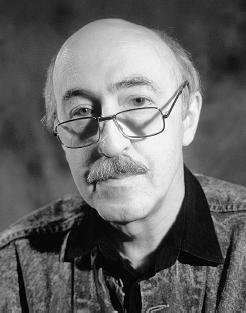Otar Ioseliani - Director
Nationality:
Soviet Georgian.
Born:
2 February 1934.
Education:
Educated in music, Tbilisi Conservatory; studied graphic art; degree in
mathematics, Moscow University; studied under Alexander Dovzhenko,
V.G.I.K., Moscow.
Career:
Directed first feature,
April
, 1961; failed to receive authorization for its distribution, abandoned
filmmaking; returned to direct
Listopad
, 1966.
Awards:
FIPRESCI Prize, Berlin Festival, for
Pastorale
, 1982.
Films as Director:
- 1958
-
Akvarel ( Watercolor ) (short, for TV)
- 1959
-
Sapovnela ( The Song about Flowers ) (short)
- 1961
-
April ( Stories about Things ) (not released) (+ sc)
- 1964
-
Tudzi ( Cast-Iron (+ sc) (short)
- 1966
-
Listopad ( When Leaves Fall ; Falling Leaves )
- 1969
-
Starinnaja gruzinskaja pesnja ( Old Georgian Song (short)
- 1972
-
Zil pevcij drozd ( There Was a Singing Blackbird ; There Lived a Thrush ) (+ co-sc)
- 1976
-
Pastoral ( The Summer in the Country ) (+ co-sc)
- 1982
-
Lettre d'un cinéaste (short, for TV)
- 1983
-
Sept pièces pour cinéma noir et blanc ( Seven Pieces for Black and White Cinema )
- 1984
-
Les Favoris de la Lune
- 1988
-
Un petit monastère en Toscane ( A Little Monastery in Tuscany )
- 1989
-
Et la lumière fut ( And Then There Was Light )

- 1992
-
La Chasse aux papillons ( Chasing Butterflies ) (+ sc, ed)
- 1994
-
Seule, Georgie
- 1996
-
Brigands, chapitre VII (+ sc, ed)
- 1997
-
Adieu, plancher des vaches! ( Farewell, Home Sweet Home )(+ sc, ed, ro as Father)
Publications
By IOSELIANI: articles—
Interview with G. Kopanevová, in Film a Doba (Prague), May 1974.
Interview with Michel Ciment, in Positif (Paris), May 1978.
Interview with Serge Daney and S. Toubiana, in Cahiers du Cinéma (Paris), November 1979.
Interview with A. Gerber, in Film a Doba (Prague), February 1981.
Interview with Serge Toubiana and Alain Bergala, in Cahiers du Cinéma (Paris), February 1985.
Interview with Michel Ciment, in Positif (Paris), November 1992.
Interview with Jacques Kermabon and Marcel Jean, in 24 Images (Montreal), April-May 1993.
Interview with Michel Euvrard, in Ciné-Bulles (Montreal), Summer 1993.
Interview with Iskra Bočinova, in Kino (Sophia), no. 1, 1996.
Interview with René Prédal, in Jeune Cinéma (Paris), March-April 1997.
On IOSELIANI: articles—
Cereteli, K., "Stat' ja iz gazety 'Zarja Vostoka'," in Iskusstvo Kino (Moscow), November 1973.
"Il était une fois un merle chanteur de O. Iosseliani," in Revue Belge du Cinéma (Brussels), vol. 13, no. 1–2, 1975/76.
Martin, Marcel, "L'Art 'Comme la vie' d'Otar Iosseliani," in Image et Son (Paris), September 1980.
"Ioseliani Section" of Positif (Paris), January 1985.
Gauthier, G., and R. Bassan, "Otar Ioseliani," in Revue du Cinéma (Paris), February 1985.
Navailh, F., "Otar Ioseliani," in Cinéma (Paris), February 1985.
Christie, Ian, "Pastoral Hide and Seek," in Monthly Film Bulletin (London), March 1985.
Fell, H., "Wenn alles gut geht," in EPD Film (Frankfurt), June 1990.
Bogomolov, Ju., and others, "U vremeni v gostjah?" in Iskusstvo Kino (Moscow), April 1993.
* * *
The Georgian cinema, which has a history dating back to the 1920s, experienced a renaissance in the 1960s with Otar Ioseliani as its most remarkable representative. Together with Tarkovsky (but in a very different way) he is the Soviet director who has been the most uncompromising and the most consistent in his aesthetic approach. Born in 1934, he studied music as well as graphic art at the Tbilisi Conservatory, and graduated from Moscow University in mathematics. But finally he chose cinema as his favorite field and graduated from VGIK after attending Alexander Dovzhenko's class. His first film, April , of which little is known, was not released. His second, When Leaves Fall , shows the characteristic elements of his style. Ioseliani, like many of his contemporaries, is hostile to the cinema of Eisenstein—to his intellectual montage and to the theoretical aspect of his work. In presenting Jean Vigo as his master, Ioseliani insists that he tries "to capture moments of passing life," and in doing so wants to reach the ultimate goal of art. In a way, his films are close to the Czech new wave (Forman, Passer, Menzel), but realism is counterbalanced by a more formal treatment, particularly in the use of sound and off-screen space.
His films also show a disregard for conventional ways of life. Ioseliani's nonconformity, stubbornness, and frankness have alienated authorities. When Leaves Fall takes place in a wine factory and shows an innocent and honest young man trying to live in a bureaucratic universe. He does not wear a moustache, that Georgian symbol of bourgeois respectability.
There Was a Singing Blackbird , Ioseliani's third film, portrays the life of a musician in the Tbilisi orchestra who always arrives at the last minute to perform, being busy enjoying his life, drinking and courting girls. His behavior is an insult to an official morality based on work and duty. Ioseliani's fancifulness and sense of humor are shown at their best in this sprightly comedy that ends tragically with the hero's death. Pastoral , which had problems with the Moscow authorities (though the film was shown regularly in Georgia), is about a group of five musicians from the city who come to live with a peasant family. Ioseliani observes the opposition of city and country, and makes a young peasant girl the observer of this delightful conflict of manners and morals. Using many non-professionals—as in his earlier films—the director manages to show us poetically and with truthfulness the life of the Georgian people. Discarding any kind of plot, observing his characters with affection and irony, he is faithful to his anti-dogmatic stance: "Everyone is born to drink the glass of his life." Ioseliani's limited output is of a very high level indeed.
—Michel Ciment
Comment about this article, ask questions, or add new information about this topic: